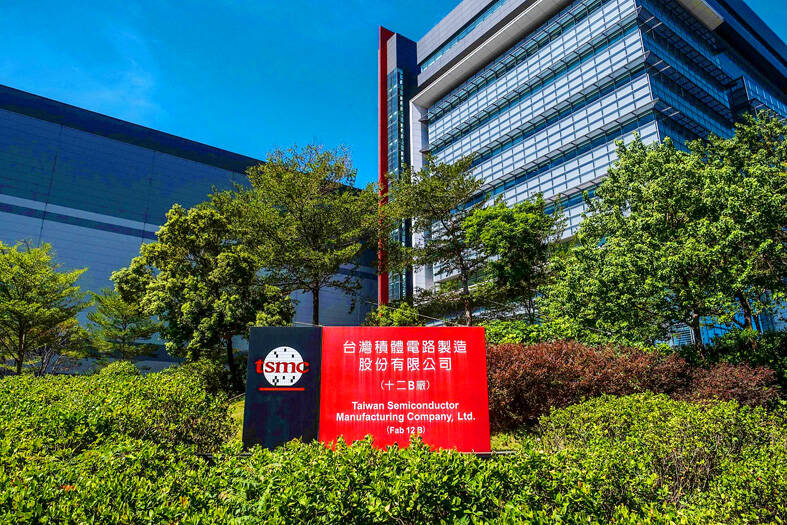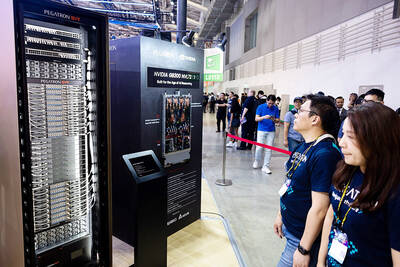Taiwan Semiconductor Manufacturing Co (TSMC, 台積電) aims to build a second chipmaking plant in Arizona, after it committed to building a US$12 billion complex in the state, the Wall Street Journal reported, citing people familiar with the plans.
The world’s largest contract chipmaker would announce its intention to establish another facility north of Phoenix, adjacent to the factory under construction, the newspaper reported.
The new investment should be similar to the first project’s, it added.

Photo: Lam Yik Fei, Bloomberg
Representatives for the company did not respond to requests for comment.
The administration of US President Joe Biden is trying to attract investments in US chipmaking, part of efforts to counter China’s ambitions and secure components vital to US national security. That effort accelerated after widespread shortages that began in late 2020 and last year drove home how chips were central to the production of everything from vehicles to smartphones.
Washington, which is dangling incentives of about US$50 billion for local projects, has hailed TSMC’s Arizona expansion as a triumph in endeavors to bring advanced chipmaking to the US.
The Taiwanese company has said that it costs much more to produce semiconductors in the US, although higher expenses are manageable with state support.
TSMC, whose production sites are mostly in Taiwan, has started to diversify over the past few years to help meet demand in major countries seeking to bolster domestic semiconductor production. It joins rivals, including Samsung Electronics Co, which is establishing a US$17 billion fab in Texas.
TSMC is building a US$7 billion facility in Japan and is also in early talks with the German government about potentially establishing a plant in the country.
On Tuesday, TSMC’s board of directors approved a budget of US$5.71 billion, with the vast majority to be spent on production involving specialty and advanced manufacturing processes.
TSMC said advanced manufacturing processes would receive about 70 to 80 percent of the funding, while 10 to 20 percent would be spent on specialty processes, with the remaining about 10 percent earmarked for advanced packaging and testing, as well as photomasking development.
TSMC last month said it would cut its capital expenditure for this year to about US$36 billion from the lower end of a range from US$40 billion to US$44 billion in the previous capital spending plan, citing short-term market uncertainty.
The global semiconductor industry is undergoing inventory adjustments at a time when major central banks have raised key interest rates to fight fast-growing inflation, which has hurt demand.
Additional reporting by CNA

AI TALENT: No financial details were released about the deal, in which top Groq executives, including its CEO, would join Nvidia to help advance the technology Nvidia Corp has agreed to a licensing deal with artificial intelligence (AI) start-up Groq, furthering its investments in companies connected to the AI boom and gaining the right to add a new type of technology to its products. The world’s largest publicly traded company has paid for the right to use Groq’s technology and is to integrate its chip design into future products. Some of the start-up’s executives are leaving to join Nvidia to help with that effort, the companies said. Groq would continue as an independent company with a new chief executive, it said on Wednesday in a post on its Web

RESPONSE: The Japanese Ministry of Finance might have to intervene in the currency markets should the yen keep weakening toward the 160 level against the US dollar Japan’s chief currency official yesterday sent a warning on recent foreign exchange moves, after the yen weakened against the US dollar following Friday last week’s Bank of Japan (BOJ) decision. “We’re seeing one-directional, sudden moves especially after last week’s monetary policy meeting, so I’m deeply concerned,” Japanese Vice Finance Minister for International Affairs Atsushi Mimura told reporters. “We’d like to take appropriate responses against excessive moves.” The central bank on Friday raised its benchmark interest rate to the highest in 30 years, but Bank of Japan Governor Kazuo Ueda chose to keep his options open rather than bolster the yen,

Even as the US is embarked on a bitter rivalry with China over the deployment of artificial intelligence (AI), Chinese technology is quietly making inroads into the US market. Despite considerable geopolitical tensions, Chinese open-source AI models are winning over a growing number of programmers and companies in the US. These are different from the closed generative AI models that have become household names — ChatGPT-maker OpenAI or Google’s Gemini — whose inner workings are fiercely protected. In contrast, “open” models offered by many Chinese rivals, from Alibaba (阿里巴巴) to DeepSeek (深度求索), allow programmers to customize parts of the software to suit their

Global server shipments are expected to surge to 15 million units next year, from 4 million units this year, with artificial intelligence (AI) servers accounting for about 30 percent, driven by massive capital spending by major cloud service providers, the Market Intelligence and Consulting Institute (MIC) said on Thursday last week. Major cloud service providers — including Google’s parent company Alphabet Inc, Microsoft Corp, Amazon.com Inc and Meta Platforms Inc — are projected to budget US$450 million for capital expenditure next year, up from US$400 million this year, MIC ICT [information and communications technology] Industry Research Center director Edward Lin